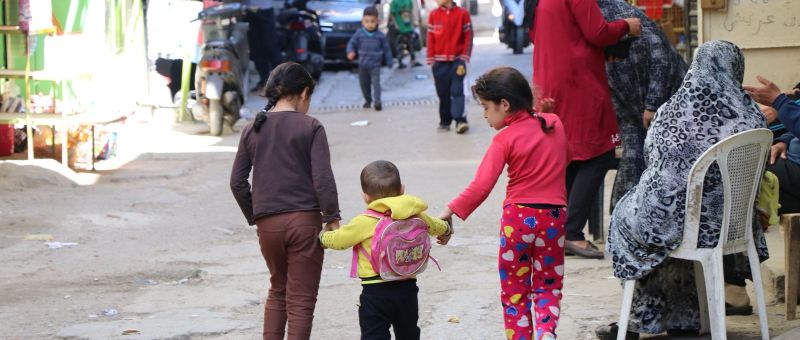What insights into ideology, relationality and hierarchy can we gain by examining the role of faith in displacement, and in the acts of hosting and being hosted? In this post, Karen Lauterbach (University of Copenhagen) discusses hybrid forms of faith-based hosting and draws on her research with Congolese refugee churches in Kampala, Uganda. Lauterbach examines…
Tag: Refugees hosting refugees
Drawing the Camp: Graphic Essay of Community Organising, Local Aid and ‘Refugee Humanitarianism’ in Irbid Refugee Camp
Displaced communities - whether long-time residents of camps and urban areas, or newly arrived refugees - are also often hosts, offering support to fellow refugees through community-led initiatives, or simple acts of everyday hospitality. This 'refugee-refugee humanitarianism' disrupts mainstream humanitarian narratives, which typically frame displaced peoples as passive recipients of aid. In order to challenge…
The Localisation of Aid and Southern-led Responses to Displacement
The Localisation of Aid and Southern-led Responses to Displacement: Beyond instrumentalising local actors By Elena Fiddian-Qasmiyeh, Refugee Hosts PI and UCL Displacement is primarily a ‘Southern’ phenomenon, with around 90% of all refugees having fled from one country in the global South to another Southern state, through processes of South-South migration. It is equally the…
Refugee Neighbours & Hostipitality
Accounting for the roles of local communities is a key aim of our project, and of the 'Localisation of Aid' agenda more broadly. However, as a result of the mainstream narratives that pervade the literature on conflict-induced displacement, efforts to properly engage with the local have been held back by a failure to fully recognise…
The Kindness of Strangers: The Challenges and Rewards of Opening Your Home to Refugees
In this piece, which is a reposting from The Sunday Herald (originally published 18 June 2017), Professor Alison Phipps of the University of Glasgow reflects on her experiences hosting her former host in Glasgow, a refugee displaced by conflict in Sub-Saharan Africa. It is a fascinating example of guest-host reciprocity, something we are exploring in…
Space of Refuge: Installation and Symposium
Between 10th - 15th March, the P21 Gallery in Somers Town, London will be hosting a spatial installation, Space of Refuge, which has emerged out of extensive fieldwork by Samar Maqusi, a PhD student at the Bartlett School of Architecture (UCL), who has also contributed to the Refugee Hosts blog (see here and here). Samar's research in Lebanon and Jordan investigates…
Q&A with Yousif M. Qasmiyeh
In this piece, which is a re-posting from the Asymptote blog, Theophilus Kwek interviews the Refugee Hosts writer in residence Yousif M. Qasmiyeh about his work, and the themes of displacement, exile and belonging that inform his poetry and writing. Read Yousif's poetry for the Refugee Hosts project here. Q&A with Yousif M. Qasmiyeh By…
Writing the Camp
Vis-à-vis or a Camp by Yousif M. Qasmiyeh, University of Oxford “To experience is to advance by navigating, to walk by traversing.” Derrida, Points..., p.373 I What makes a camp a camp? And what is the beginning of a camp if there is any? And do camps exist in order to die or exist forever?…
Refugees Hosting Refugees
In an article published today in a special issue of Forced Migration Review on 'Local Communities: first and last providers of protection' (issue 53), Elena Fiddian-Qasmiyeh draws on her ongoing research into the experiences of local communities hosting refugees in the Middle East to interrogate the widespread assumption that the local communities hosting refugees are composed of settled and established groups of citizens.









You must be logged in to post a comment.